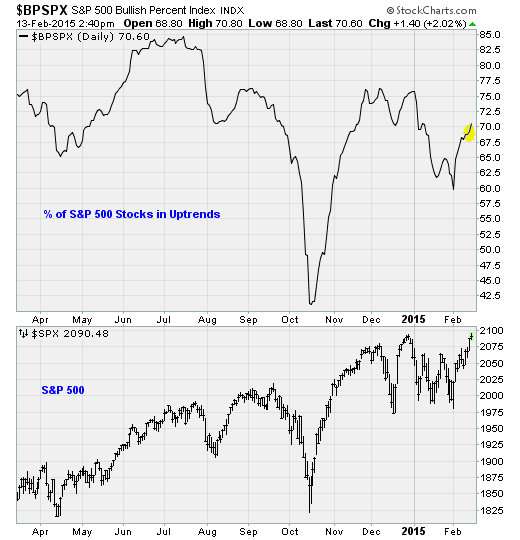What's pushing stocks on their record run
And just like that, the S&P 500 and Russell 2000 have zoomed to a new record high, with the Dow Jones industrial average not far behind and Nasdaq at a 15-year high.
On Friday, after being mired in the muck since November, stocks soared into rare air ahead of the long Presidents' Day weekend. In doing so, investors set aside worries about Greece, a drop in consumer confidence and spending, fighting in Iraq and Ukraine, and a plethora of other concerns.
Not even the specter of a rate hike from the Federal Reserve later this year, which the bond market is still not willing to come to terms with based on futures data, could slow the progress.
A number of factors are driving this newfound enthusiasm.
For one, at least on the surface, this week featured some positive headlines out of Europe concerning negotiations with Greece, over its demands for a bailout program modification, and Russia, on a cease-fire in Ukraine.
Substantively, both dramas are nowhere near resolutions. Russia has frequently duped markets by playing nice for the cameras but continuing its support for Ukraine's pro-Russian rebels. And Greek politicians and European bureaucrats remain far apart on the terms of any new financing deal as Athens faces the prospect of a cash crunch in a matter of weeks.
Indeed, on Thursday Eurogroup head Jeroen Dijsselbloem warned: "Don't get your hopes up yet" on Greece. The German press has also been highlighting the cost of a Grexit, or Greece abandoning the euro, to German taxpayers.
Tensions remain high as people compare the confidence expressed by German business unions that the eurozone could withstand Greece leaving the common currency with the dangerous obsession with moral hazard that led to the collapse of Lehman Brothers in 2008. Greek Finance Minister Yanis Vardoulakis has declared that the euro is fragile: "It is like a house of cards. If you pull away the Greek card, they all come down."
A new meeting is scheduled for Monday, but an agreement (assuming there is one) is unlikely without further gamesmanship.
Another big factor pushing Wall Street higher has been the rebound in energy prices since late January as investors have reacted to a drop in the number of U.S. drilling rigs in operation. The fact that crude has been spending time above the $50-a-barrel threshold has played a big role in lifting stocks as beaten down energy shares have enjoyed a big bounce, thanks in part to short covering.
But analysts continue to warn that until we see meaningful production cuts (not just drops in drilling rig counts) as well as inventory reductions, prices are likely to slide lower again.
The problem is that U.S. energy producers, in an effort to lower their cost profile given the precipitous decline in oil prices from last summer's highs, are shutting down less productive, less profitable fields. But by keeping their best quality fields running, production hasn't yet turned lower.
In fact, while the U.S. rig count recently dropped by the most since 1993, production has hit a record high. And U.S. oil inventories remain near a 80-year high.
Bank of America Merrill Lynch analyst Francisco Blanch sees floating oil storage -- basically parked oil tankers -- coming into play in the months to come as land-based tanks across North America, Asia and Europe fill up. And with oil demand growth accelerating only slowly this year, he's looking for prices to fall as low as $35 in the near term.
These two factors (European headlines and oil prices) have translated into record highs for stocks via what's been fairly narrow buying interest, with much focus this week on heavily weighted component Apple (AAPL) in the wake of a new bond issuance denominated in Swiss francs. Note that the percentage of S&P 500 stocks in uptrends stands near 70 percent vs. 76 percent when they were peaking in November and December and 85 percent when highs were hit in July.
Jason Goepfert at Sundial Capital Research noted that the end of the February has, historically, been a difficult one for stocks. The bulls don't have the benefit of seasonality. Over the last 52 years, the S&P 500 has been positive from the 10th trading day through the end of the month only 42 percent of the time, with an average change of -0.5 percent.
Lately, since the inceptions of the SPY exchange-traded fund, the win rate has dropped to one-third, with an average return of -1.0 percent.
After celebrating the records, investors would do well to proceed with caution.
